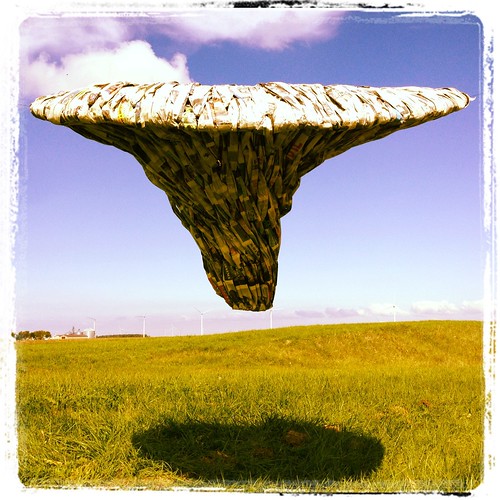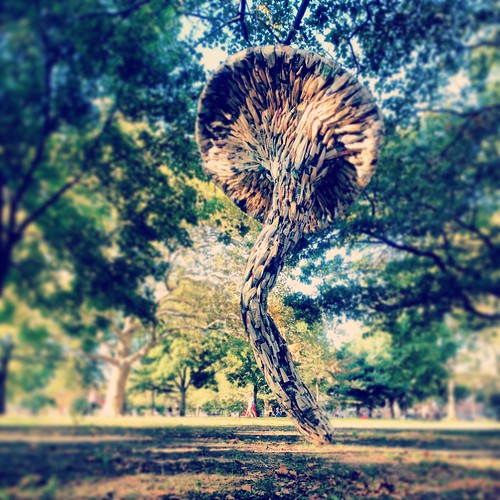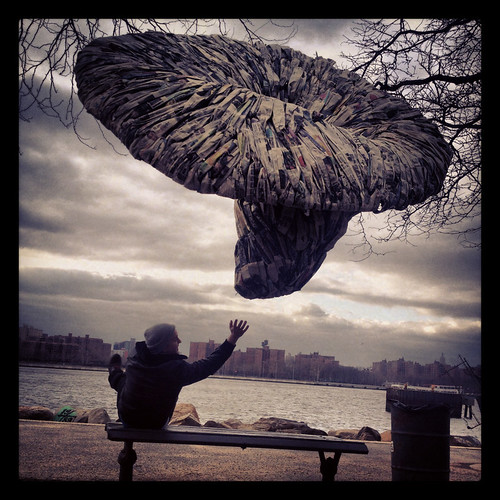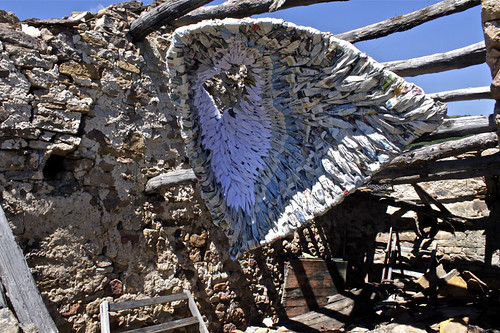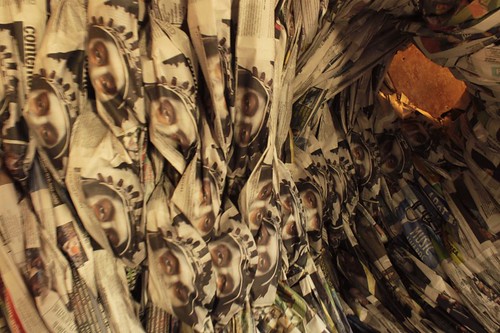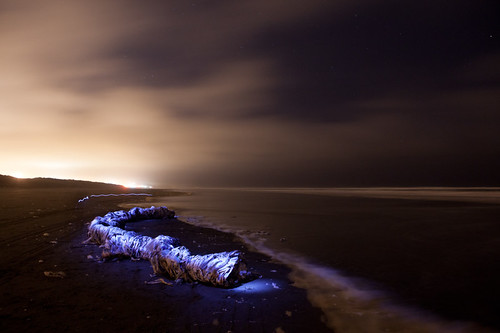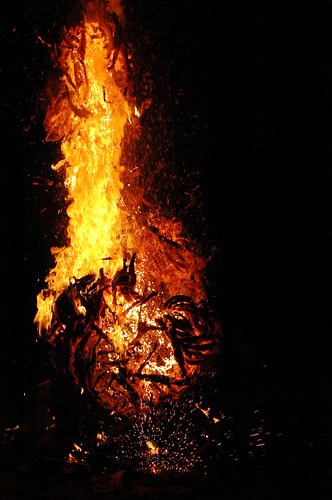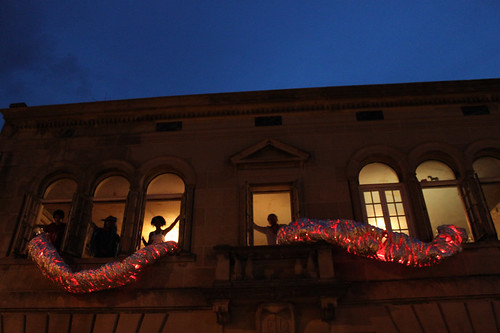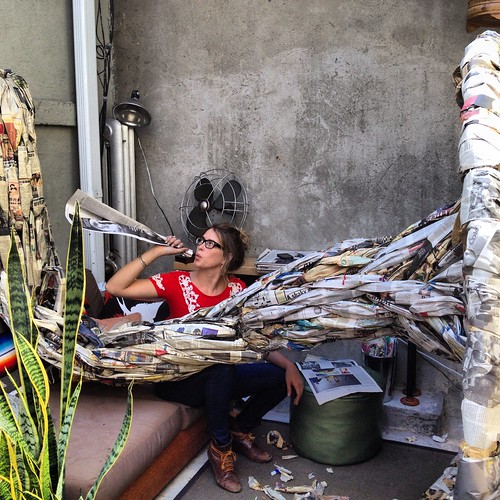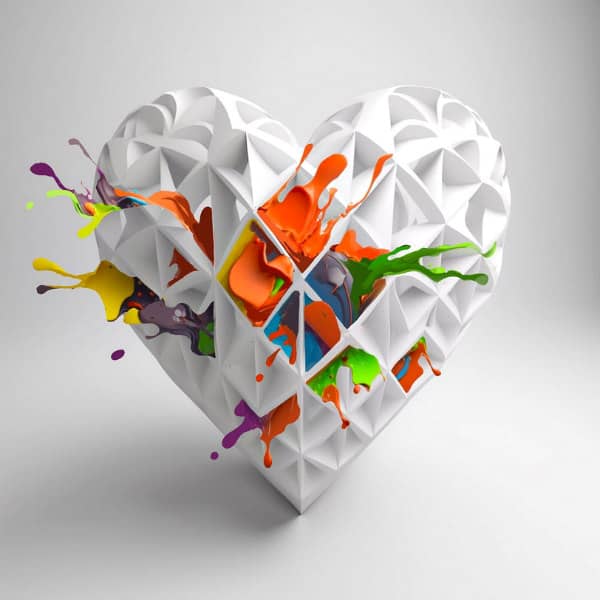Paper Sculpture Installation Artist - Erin Turner
While tooling around on Instagram, I was stopped in my tracks by a photo Grace Bonney of Design Sponge had snapped of an intriguing paper sculpture in Brooklyn's McCarren Park. What's that whirling dervish?! Grace identified the artist... soon I was writing to Erin Turner to learn more about her fascinating tornadoes.
She is a traveling installation artist who has already created quite a few opportunities to showcase her avant-garde work. About a year ago, a fully funded Kickstarter project, In the Eye of the Storm - A Tornado Installation, launched a trip where she set up and photographed her woven paper sculptures from California to New York and beyond.
I asked Erin to tell us about her artistic journey.
I began as a painter, but quickly became very interested in large-scale sculptural installation work. I am quite a nomad at heart, and travel has always been a very important aspect of my life, so it was apparent that I must find a way to marry my two passions.
I began traveling with my sculptures. I first made a trip from Oklahoma where I was born and raised, to San Francisco where I was installing a show in a gallery. I had an assistant with me, and we drove a U-Haul across the country, installing in spectacular scenery.
We installed at the Grand Canyon, the Mohave Desert, and Fort Funston in San Francisco. This became an obsession and I quickly began installing in every location that I found myself, including Koh Phangan Thailand, and Gokarna, India.
Readers will be curious about your use of newspaper and the technique you've developed for weaving the pages. The sculptures appear to be surprisingly durable, yet I have the sense that no glue is involved.
And the burning of the
sculptures... why?
This element of the sculptural work and portfolio of images that I am collecting speaks to their temporary aspect. The burning becomes a performance that the public is invited to join. The sculptures that I have burned have represented themes such as the Phoenix - the bird who lights itself on fire and begins again to be hatched from an egg - signifying a rebirth, restoration, and reincarnation. I have also burned sculptures to represent a reverence or offering to a certain subject matter or people. I often create work that references ancient ethnic philosophies, such as Mesoamerican, Balinese, Eastern, and Middle Eastern.
Financing such projects is often a huge hurdle. If I may ask, how are you managing that aspect?
There is never one answer. Sometimes I finance my trips with grants, or personal funding methods, such as the Kickstarter campaign. I sell my paintings, handmade jewelry, sculptures, and installation photography, and funnel the income into other projects. As you saw on the Kickstarter video, I am currently working on a project with the tornado series that will end in a photography book and gallery show.
Thanks Erin, I look forward to seeing what's next for you! Any hints?
She is a traveling installation artist who has already created quite a few opportunities to showcase her avant-garde work. About a year ago, a fully funded Kickstarter project, In the Eye of the Storm - A Tornado Installation, launched a trip where she set up and photographed her woven paper sculptures from California to New York and beyond.
I asked Erin to tell us about her artistic journey.
I began as a painter, but quickly became very interested in large-scale sculptural installation work. I am quite a nomad at heart, and travel has always been a very important aspect of my life, so it was apparent that I must find a way to marry my two passions.
I began traveling with my sculptures. I first made a trip from Oklahoma where I was born and raised, to San Francisco where I was installing a show in a gallery. I had an assistant with me, and we drove a U-Haul across the country, installing in spectacular scenery.
We installed at the Grand Canyon, the Mohave Desert, and Fort Funston in San Francisco. This became an obsession and I quickly began installing in every location that I found myself, including Koh Phangan Thailand, and Gokarna, India.
Readers will be curious about your use of newspaper and the technique you've developed for weaving the pages. The sculptures appear to be surprisingly durable, yet I have the sense that no glue is involved.
Although I
have worked with a variety of paper, newspaper continues to be my
favorite. It is not just about the availability of the material, but it
also speaks to a very specific location, people, language, and time.
Using the local newspaper also speaks
to those specific variables. The sculptures are made of two
materials only: chicken wire and newspaper. No glue is used. They can withstand rain and dry out quickly due to the hollow
nature of the form. After newspaper is dampened, it becomes quite
coarse and hardens in a particular way. The longest the sculptures have
been installed in a public, outdoor space is six weeks. These were
installed for the Ephemeral Arts Festival that the Restoration Project
holds each year in the Swindler Cove park in Manhattan. Although a small amount of repair work needed to be done due
to heavy rains and wind, the sculptures are made to act as a temporal
form manipulated by the natural elements.
How do you choose sites for installations, such as your Spaceworms?
How do you choose sites for installations, such as your Spaceworms?
The method of
choosing locations is based on the landscape variety. Also, because of the photographic book, the location that I
install depends on the type of photograph that I am looking for, such as
a variety of locations, times of day, urban vs. rural, models (both
fantastical and ordinary), etc. Often I work with dancers and other
performers to produce performances that are filmed as well as
photographed. This leads me to different set design projects that I have
done for musicians, dancers (ballet and contemporary), and television
sets.
This element of the sculptural work and portfolio of images that I am collecting speaks to their temporary aspect. The burning becomes a performance that the public is invited to join. The sculptures that I have burned have represented themes such as the Phoenix - the bird who lights itself on fire and begins again to be hatched from an egg - signifying a rebirth, restoration, and reincarnation. I have also burned sculptures to represent a reverence or offering to a certain subject matter or people. I often create work that references ancient ethnic philosophies, such as Mesoamerican, Balinese, Eastern, and Middle Eastern.
Financing such projects is often a huge hurdle. If I may ask, how are you managing that aspect?
There is never one answer. Sometimes I finance my trips with grants, or personal funding methods, such as the Kickstarter campaign. I sell my paintings, handmade jewelry, sculptures, and installation photography, and funnel the income into other projects. As you saw on the Kickstarter video, I am currently working on a project with the tornado series that will end in a photography book and gallery show.
Thanks Erin, I look forward to seeing what's next for you! Any hints?
I'm starting a series of wall hanging sculptural pieces that are embedded with lights. I keep up-to-date photographs @eturnerinstall on Instagram.

